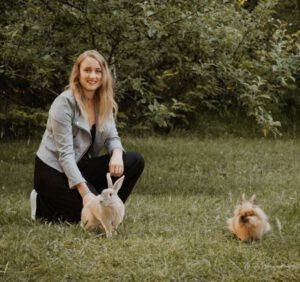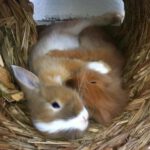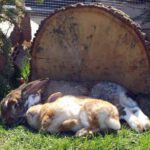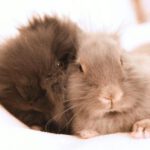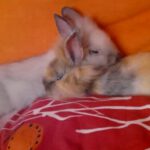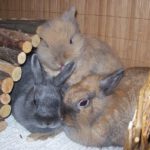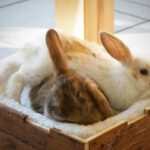Contents
- Recognizing Rabbit Illnesses
- Behavior„My rabbit is behaving differently than usual.“
- Weight„My rabbit looks thin/has lost weight.“
- Eating Behavior„My rabbit isn’t eating or is eating less than usual.“
- Coat & Skin Condition„My rabbit has bald spots in its fur, wounds on its skin, or is scratching itself.“
- Coprophagy„My rabbit eats its own or another rabbit’s feces.“
- Eye Changes„My rabbit’s eyes look injured/sick.“
- Thickening/Swelling/Protruding Areas„My rabbit has a swelling or lump on its body.“
- Nose„My rabbit has nasal discharge or is bald around the nose.“
- Changes in Poop and Urine„My rabbit has different poop/urine than usual or is dirty around the bottom!“
- Teeth Grinding„My rabbit is grinding its teeth.“
- Neurological Symptoms„My rabbit has seizures, spasms, head tilt…“
- Ears„My rabbit is scratching its ears or there are abnormalities visible.“
- Teeth„The teeth don’t look healthy or are too long!“
- Movement Behavior„My rabbit is moving differently than usual.“
- Breathing„My rabbit has unusual breathing.“
- Which Rabbit Diseases Are Most Common?
Recognizing Rabbit Illnesses
Every rabbit can fall ill at some point. To detect illnesses early, it’s important to observe your rabbit daily and closely examine it if you notice anything unusual. If needed, consult a veterinarian promptly. Learn how to properly check your rabbit’s health here: Health Check.
Signs of illness in rabbits are often subtle, and even severely ill rabbits may go unnoticed by their owners. That’s why I strongly encourage you to pay close attention and take action at the first sign of any irregularities!
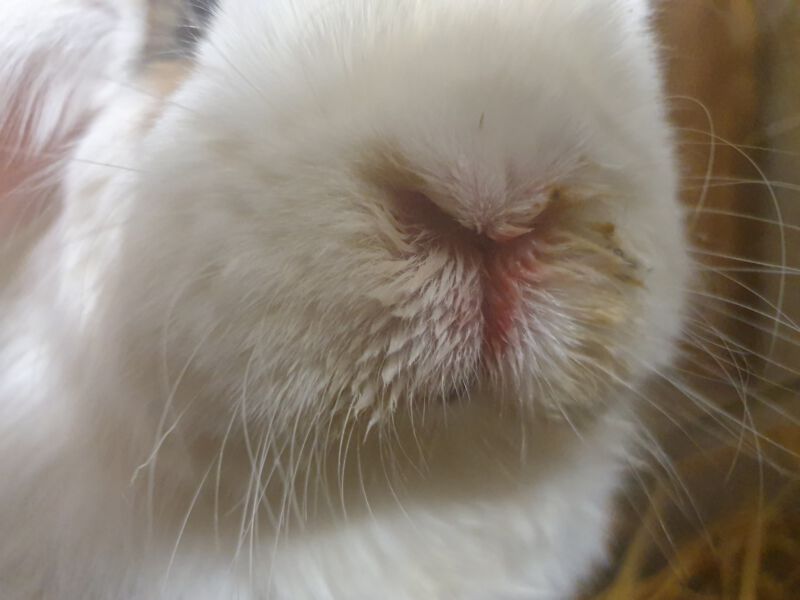
Many owners report that their rabbits were found “suddenly dead in the hutch.” However, almost always, subtle signs of illness precede the death (the rabbit was quieter than usual, ate less or nothing, drank more water…). Unfortunately, the animal was not taken to a veterinarian.
Living closely with your rabbits has its advantages. For example, those who keep their rabbits in free-roaming indoor housing can often detect signs of illness early. The better you know your rabbits, their quirks, and their habits, the more likely you are to notice changes quickly.
„Rabbits and guinea pigs suffer in silence because, as prey animals, they must avoid appearing sick in the wild. Even the slightest signs of illness are always a reason to visit a veterinary clinic the same day. Careful observation by the owner and regular veterinary care ensure that even small pets can enjoy increasingly longer lives.“
— Federal Association of Practicing Veterinarians (bpt)
Behavior
„My rabbit is behaving differently than usual.“
Rabbits are prey animals by nature and have difficulty truly relaxing. In the wild, any unusual behavior would make them an easy target for predators like birds of prey, martens, or foxes. This instinct is why our domestic rabbits also rarely show changes in behavior, even when they are in severe pain or seriously ill.
For this reason, always take any signs of illness very seriously and promptly consult a rabbit-savvy veterinarian (emergency services if necessary).
Typical Signs of Illness:
- A rabbit does not come for feeding, even though it usually shows up immediately.
- It stays inside its enclosure during free roam, even though it is normally at the door right away.
- It sits or lies around apathetically.
- It suddenly allows itself to be picked up or cuddled, or becomes unusually tame.
- It appears weak or lethargic.
- It behaves differently than usual.
- It hunches up or crouches.
- It does not respond to external stimuli.
- …
These signs of illness indicate an acute, already advanced condition, and the rabbit is in very poor, often life-threatening, health. Without veterinary assistance, death is imminent. There are many diseases that could be the underlying cause.
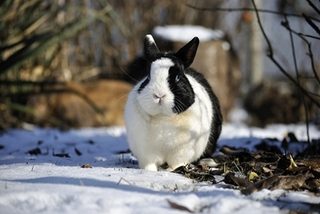
Weight
„My rabbit looks thin/has lost weight.“
Weight fluctuations are normal due to „winter fat“ (an increase in autumn, a decrease in spring). However, if a rabbit suddenly or gradually loses weight or appears emaciated, it is a serious sign of illness. Many diseases can cause such weight loss, such as kidney failure, dental diseases, or digestive disorders. Usually, a blood test is necessary to determine the cause.
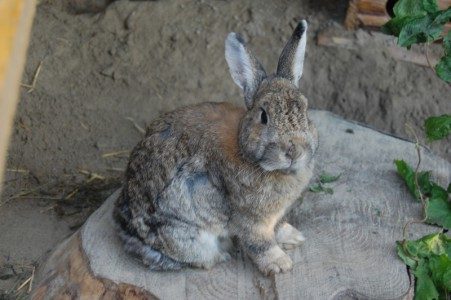
Eating Behavior
„My rabbit isn’t eating or is eating less than usual.“
When a rabbit refuses or stops eating (due to digestive disorders, pain, or acute illness), this is a serious sign of illness. It’s also concerning if the rabbit tries to eat but the food falls out of its mouth, it cannot bite the food, or if it drools excessively while eating (indicating mouth or dental issues).
If the rabbit reduces its food intake, this usually signals a gradual, chronic illness that could soon become life-threatening (e.g., kidney failure). Unlike carnivores, you should never wait with rabbits – always seek veterinary help immediately (emergency services if necessary)!
Coat & Skin Condition
„My rabbit has bald spots in its fur, wounds on its skin, or is scratching itself.“
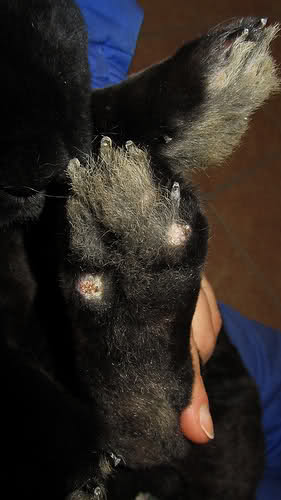
It is normal for rabbits to shed heavily in the spring or fall (for indoor rabbits, this can happen at different times). This is part of the seasonal coat change. If a female rabbit pulls out its fur to build a nest, it is (falsely) pregnant, which doesn’t require veterinary treatment unless it happens frequently.
If another rabbit is pulling out its fur, you should consider rearranging the group or taking other measures. Similarly, if the rabbit is licking or chewing areas of itself or another rabbit until they become sore, the cause should be investigated. In all other cases, a veterinarian should be consulted, for example, if…
Coat & Skin Condition
- Scratching frequently* (mites, fungus…)
- Bald spots appear* (mites, fungus…)
- Visible wounds that need treatment* (severe/heavy bleeding wounds should be treated as an emergency!)
- Matted fur* or the rabbit is not grooming itself properly (dirty/unkempt fur)*
- Visible dandruff* (mites, fungus…)
- Crusts/scabs or redness appear* (mites, fungus…)
- Wound areas noticed* (mites, wounds, fungal infections…)
- Fur under the chin is wet* (dental diseases…)
- The rabbit often urinates or defecates on itself* (urinary tract diseases, joint problems, diarrhea…)
- The fur is not healthy/shiney, but rough, dull, or clumped together…*
- Pale mucous membranes*
- Scabs on the lips* (e.g., syphilis)
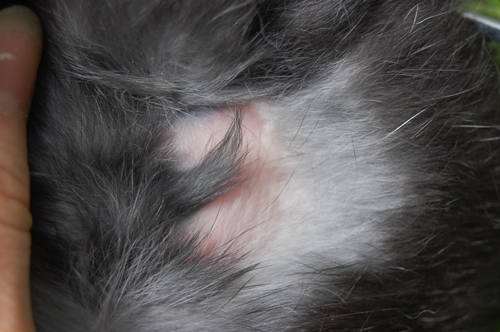
Coprophagy
„My rabbit eats its own or another rabbit’s feces.“
It is natural for rabbits to eat their own cecotropes (cecal feces). This behavior should not be prevented.
Eye Changes
„My rabbit’s eyes look injured/sick.“
Eye diseases can be recognized by the following signs:
- The eyes are tearing or have discharge*
- The eyes are bulging or hanging out*
- Injuries are visible*
- The rabbit squints or blinks frequently*
- The eyelids are swollen*
- The eyes are red*
- The eyes are sensitive to light*
- The third eyelid (nictitating membrane) is visible*
- There is a ring around the eye*
- The eye is cloudy*
- The eye is no longer visible*
- The eyes are unusually rotated (not symmetrical)*
- Injuries to the eyelid are visible*
It is recommended to see a veterinarian who specializes in ophthalmology. Do not make the mistake of „experimenting,“ as this can often result in the loss of the rabbit’s eyesight.
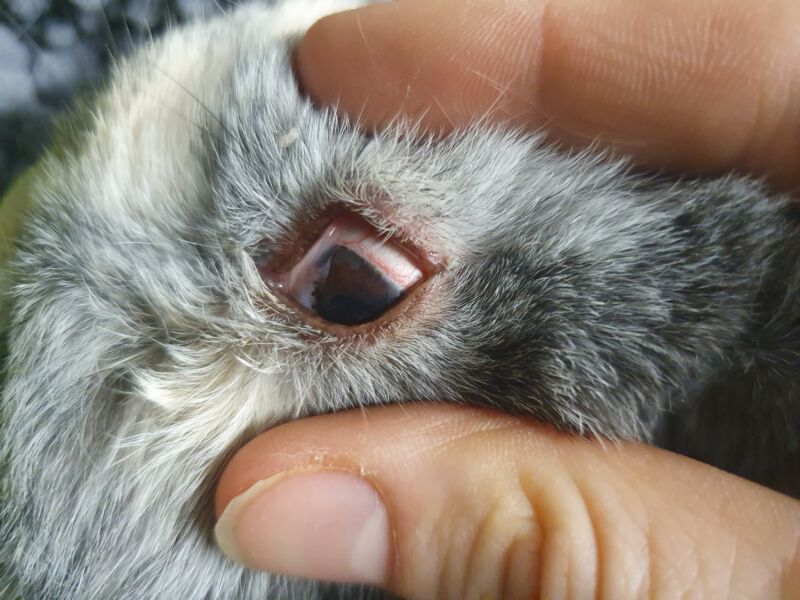
Thickening/Swelling/Protruding Areas
„My rabbit has a swelling or lump on its body.“
It is normal for rabbits to have a hanging „fat pouch“ under their chin, called a dewlap. In cases of obesity, fat folds can also develop. Any other swellings, lumps, or growths require treatment*. These symptoms can be detected by palpation (touching/feeling).
A veterinarian should be consulted if:
- Swellings are visible on the eyelids, genital area, etc.* (often caused by diarrhea, syphilis, or myxomatosis)
- Lumps are either movable or firmly attached* (e.g., abscesses, tumors…)
- The abdomen or part of the abdomen feels hard, taut, or bloated* (digestive disorders)
- The mammary glands are swollen, even though the rabbit is not (falsely) pregnant*
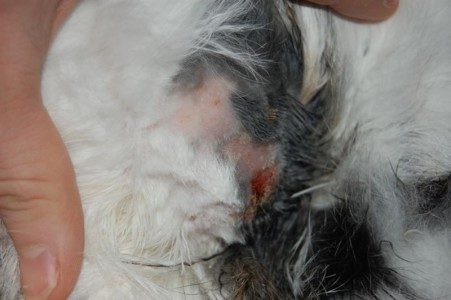
Nose
„My rabbit has nasal discharge or is bald around the nose.“
A veterinarian should be consulted if:
- The nose has discharge*
- The nose is crusted*
- The front paws are crusted (due to grooming movements)*
- Bald spots have formed around the nose*
- The rabbit is sneezing*
- The rabbit is excessively grooming its nose*
The most common cause of nasal discharge is respiratory illness, but other causes, such as dental diseases, should also be considered.
Changes in Poop and Urine
„My rabbit has different poop/urine than usual or is dirty around the bottom!“
For this, I refer to the Poop Guide, which helps identify diseases based on the condition of the poop: Small Poop and Urine Guide.
It is important to regularly have a stool sample checked for parasites (coccidia, worms, etc.), as untreated intestinal parasites can lead to diseases like digestive disorders and general weakening. A stool sample should be submitted to the veterinarian at least once a year before vaccination, preferably twice.
- If the general condition is good (visit the veterinarian by the next day at the latest)*
- If the general condition is poor (emergency services!)*
- If the rabbit can no longer pass poop, this is also an acute sign of illness (emergency services!)*
- Discharge from the vagina requires treatment,* as does when the rabbit strains but does not urinate. (Emergency services!)*
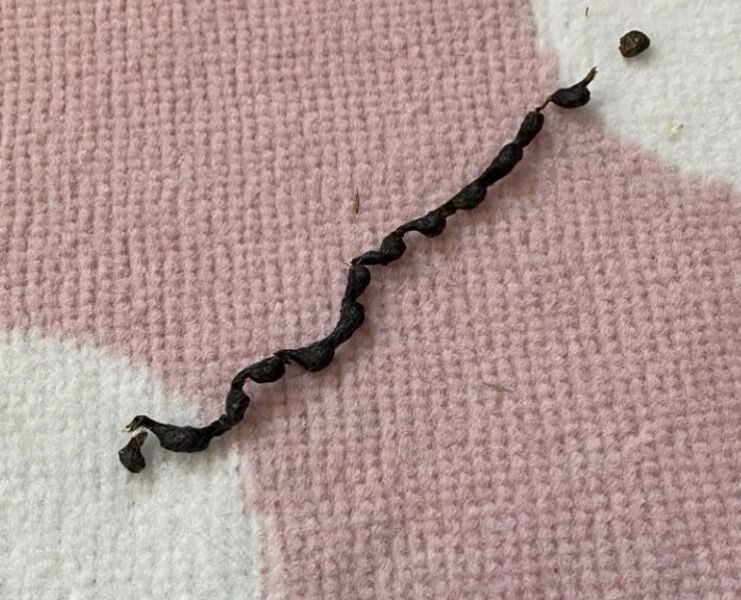
Teeth Grinding
„My rabbit is grinding its teeth.“
Teeth grinding can be a sign of pain or relaxation, but it can also have other causes. If a rabbit is grinding its teeth, it is important to observe it closely to notice any other symptoms* early on. Pay particular attention to changes in behavior, food intake, and poop.
Neurological Symptoms
„My rabbit has seizures, spasms, head tilt…“
A veterinarian should be consulted immediately if:
- The rabbit is holding its head at an angle*
- The rabbit is having spasms or seizures*
- There are signs of confusion or disorientation*
- The rabbit is (partially) paralyzed*
- The rabbit suddenly falls or cannot maintain its balance*
Possible causes include the parasite E. Cuniculi, an ear infection, an injury (e.g., to the spine), arthritis/spondylosis/hip dysplasia, toxoplasmosis, a stroke, and many other conditions. Therefore, thorough diagnostics, including blood tests (including EC titers), ear examination (in cases of head tilt), X-rays (for paralysis), etc., are essential. If the wrong condition is suspected/treated, a cure is, of course, not possible!
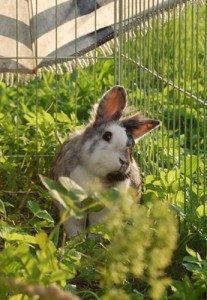
Ears
„My rabbit is scratching its ears or there are abnormalities visible.“
Ear diseases can be recognized by:
- Scabs or dandruff in the ear*
- Redness in the ear*
- Crusts in the ear*
- Blocked ear*
- „Closed“ or swollen ear*
The main causes are ear mites and ear infections.
Teeth
„The teeth don’t look healthy or are too long!“
Dental diseases can be recognized by:
- Broken teeth*
- Teeth that are too long*
- Teeth that are not growing straight*
- Brown, black, or other discolorations on the teeth or tooth tips*
Rabbit teeth grow throughout their life, so dental issues (e.g., misaligned teeth or insufficient wear due to improper diet) can have devastating effects. Rabbits can starve in front of a full food bowl. However, only the front teeth are visible; the molars remain hidden from the owner. Therefore, it is important to have the rabbit’s teeth checked by a veterinarian if there are digestive issues, refusal to eat, changes in the appearance of poop, etc.
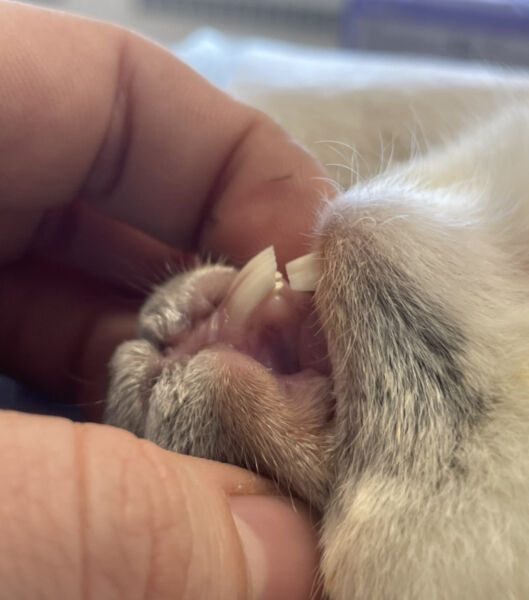
Movement Behavior
„My rabbit is moving differently than usual.“
Signs of illness:
- Abnormal posture*
- Lameness*
- Limping*
- Limbs positioned incorrectly or sticking out*
Possible causes include fractures, injuries, sore hocks, joint diseases, and E. Cuniculi. A thorough diagnosis by a veterinarian (including X-rays) is essential.
Breathing
„My rabbit has unusual breathing.“
A rabbit is ill if:
- You hear breathing sounds*
- It is breathing extremely fast or slow*
- There is noticeable, heavy abdominal breathing*
- It opens its mouth to get more air*
- It tilts its head back to get more air*
Breathing sounds in rabbits are life-threatening, and you should immediately seek emergency veterinary care!
Which Rabbit Diseases Are Most Common?
Digestive Disorders („The rabbit doesn’t want to eat“): Whenever rabbits experience pain, poor diet, or dental problems, or if they become infected with intestinal parasites or bacteria, or ingest foreign objects (such as fabric, wallpaper, plastic…), they can develop gastric dilatation, diarrhea, constipation, and more.
Dental Diseases: Not only in older rabbits but also due to genetic causes or dietary errors, dental diseases are very common.
Sore Hocks (Pododermatitis): Many rabbits develop sores on their hind legs starting around 3-4 years old. Make sure to regularly check their hind legs from underneath! Causes include hard flooring, sitting too much (lack of space, pain…), and overgrown nails.
Rabbit Snuffles: Many rabbits develop respiratory diseases that can quickly become chronic.
Eye Diseases: These are also quite common!
Bladder Sludge: Urinary tract diseases like bladder sludge often result from poor diet, illnesses that lead to less movement, or lack of space.
Ear Infections: Rabbits with floppy ears or respiratory infections are highly prone to hidden ear infections, which are often only detected once they are well advanced.
Uterine Diseases: Female rabbits often develop uterine diseases, such as tumors, unnoticed in their later years.
Flystrike: Is the rabbit’s rear dirty or is there a wound on the skin? In just a few hours, maggots can develop there and lead to death very quickly! This condition is something every rabbit owner should be aware of.
Arthritis & Co.: Many rabbits, especially large breeds, develop joint diseases as they age, with some even affected at an early age.



